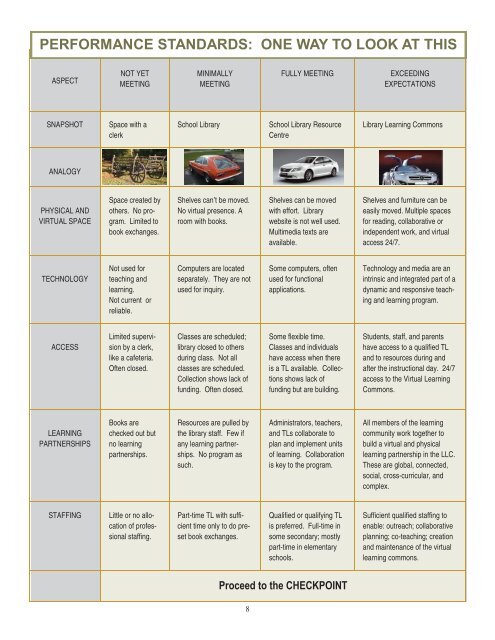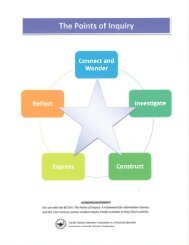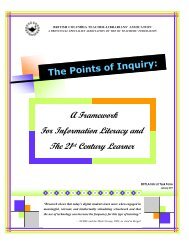FROM SCHOOL LIBRARY TO LIBRARY LEARNING COMMONS:
A source document for transforming K-12 school libraries into Library Learning Commons in BC, developed by the BC Teacher Librarians' Association
A source document for transforming K-12 school libraries into Library Learning Commons in BC, developed by the BC Teacher Librarians' Association
You also want an ePaper? Increase the reach of your titles
YUMPU automatically turns print PDFs into web optimized ePapers that Google loves.
PERFORMANCE STANDARDS: ONE WAY <strong>TO</strong> LOOK AT THIS<br />
ASPECT<br />
NOT YET<br />
MEETING<br />
MINIMALLY<br />
MEETING<br />
FULLY MEETING<br />
EXCEEDING<br />
EXPECTATIONS<br />
Use this<br />
Area to<br />
Outline<br />
Your<br />
Contents<br />
SNAPSHOT<br />
<br />
ANALOGY<br />
<br />
PHYSICAL AND<br />
VIRTUAL SPACE<br />
Space with a<br />
clerk<br />
Space created by<br />
others. No program.<br />
Limited to<br />
book exchanges.<br />
School Library<br />
Shelves can’t be moved.<br />
No virtual presence. A<br />
room with books.<br />
School Library Resource<br />
Centre<br />
Shelves can be moved<br />
with effort. Library<br />
website is not well used.<br />
Multimedia texts are<br />
available.<br />
Library Learning Commons<br />
Shelves and furniture can be<br />
easily moved. Multiple spaces<br />
for reading, collaborative or<br />
independent work, and virtual<br />
access 24/7.<br />
TECHNOLOGY<br />
Not used for<br />
teaching and<br />
learning.<br />
Not current or<br />
reliable.<br />
Computers are located<br />
separately. They are not<br />
used for inquiry.<br />
Some computers, often<br />
used for functional<br />
applications.<br />
Technology and media are an<br />
intrinsic and integrated part of a<br />
dynamic and responsive teaching<br />
and learning program.<br />
ACCESS<br />
Limited supervision<br />
by a clerk,<br />
like a cafeteria.<br />
Often closed.<br />
Classes are scheduled;<br />
library closed to others<br />
during class. Not all<br />
classes are scheduled.<br />
Collection shows lack of<br />
funding. Often closed.<br />
Some flexible time.<br />
Classes and individuals<br />
have access when there<br />
is a TL available. Collections<br />
shows lack of<br />
funding but are building.<br />
Students, staff, and parents<br />
have access to a qualified TL<br />
and to resources during and<br />
after the instructional day. 24/7<br />
access to the Virtual Learning<br />
Commons.<br />
<strong>LEARNING</strong><br />
PARTNERSHIPS<br />
Books are<br />
checked out but<br />
no learning<br />
partnerships.<br />
Resources are pulled by<br />
the library staff. Few if<br />
any learning partnerships.<br />
No program as<br />
such.<br />
Administrators, teachers,<br />
and TLs collaborate to<br />
plan and implement units<br />
of learning. Collaboration<br />
is key to the program.<br />
All members of the learning<br />
community work together to<br />
build a virtual and physical<br />
learning partnership in the LLC.<br />
These are global, connected,<br />
social, cross-curricular, and<br />
complex.<br />
STAFFING<br />
Little or no allocation<br />
of professional<br />
staffing.<br />
Part-time TL with sufficient<br />
time only to do preset<br />
book exchanges.<br />
Qualified or qualifying TL<br />
is preferred. Full-time in<br />
some secondary; mostly<br />
part-time in elementary<br />
schools.<br />
Sufficient qualified staffing to<br />
enable: outreach; collaborative<br />
planning; co-teaching; creation<br />
and maintenance of the virtual<br />
learning commons.<br />
Proceed to the CHECKPOINT<br />
8






